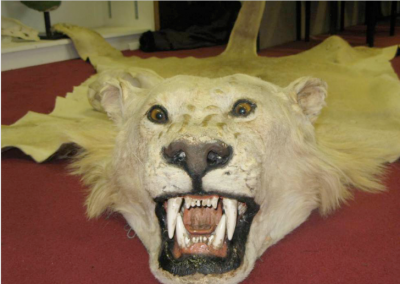News
Latest Lion Aid News
Trophy hunting should be considered a wildlife crime
Thursday 16th October 2025
|
The weight of well-documented evidence against trophy hunting operators is voluminous and compelling. Yet many in academic circles, international organizations like CITES and the IUCN, of course among trophy hunting lobbying organisations like Safari Club International, Dallas Safari Club, CIC, and even among governments allowing trophy hunting product imports, the message remains wilfully obtuse and unchanging. Trophy hunting they say, benefits rural communities, conserves wildlife populations targeted by trophy hunters, and financially supports the costs incurred by impoverished African governments to assist wildlife conservation. This has become a broken record and needs to be burned. I’ll just look at a few examples of African countries that allow trophy hunting for you to make up your own minds. I have not included South Africa – corruption is so prevalent there it might as well be recognized as a national sport, but I’m less concerned as such trophy hunting involves mainly ranched and farmed “wild animals” behind tall fences and such animals are under private ownership. TANZANIA Corruption among Tanzanian trophy hunting operators involves a range of illicit activities, including money laundering, poaching cover-ups, and embezzlement of funds meant for community development. Operators have been accused of manipulating quotas to maximize profits, exceeding hunting limits, and diverting a significant portion of revenue through bribery, kickbacks, and other illegal means, ultimately hindering both wildlife conservation and local community benefits. Types of corruption included: bribery, rent-seeking, patronage, local elite capture, embezzlement, collusion, payoffs, political corruption, customs mis-declarations, policy and legislative capture, kickbacks, cronyism, nepotism and fraud. There is sufficient evidence to conclude that a broad range of actors are involved in corruption associated with wildlife crime including politicians and high-level public officials. ZIMBABWE Corruption is a well-documented issue within Zimbabwe's trophy hunting industry, manifesting in various ways such as bribes for permits, manipulating quotas, and misrepresenting funds. This corruption undermines conservation efforts by prioritizing profit over sustainability, with funds often diverted from intended community and conservation benefits into the hands of operators and officials, according to reports from sources like the Brookings Institution and the Humane Society International. BOTSWANA Investigations show that trophy hunting in Botswana continues to impoverish local communities, causes the decline in species and heightens human-elephant conflict situations. A forensic study into Botswana’s Community Based Natural Resource Management (CBNRM) conservation system has found it to be failing the people and wildlife it was designed to support. The latest report, by researcher Dr Adam Cruise, confirms and builds on a 2016 review that found most CBNRMs were either not functioning at all or were on the verge of collapse due to poor management, corruption and other factors. The 2016 review found poverty levels in CBNRMs to be the highest in the country — 27% compared to 19.3% nationally. The income generated amounted to just $0.17 a person for the year 2015. This remains the case in 2022. BNRMs contributes to the potential collapse of elephant populations. “In short, trophy hunting in Botswana achieves the opposite of what its proponents proclaim.” The director of the Okavango Research Institute, Professor Joseph Mbaiwa, argues that local people are being ripped off by big operators because communities are not aware of the market value of what they own. “Trusts sub-lease Controlled Hunting Areas (CHAs) to safari companies without knowing the value of the concession area and natural resources found in it,” he writes.” Trusts also sell the hunting quota without knowing the value of the quota of each animal. “This amounts to someone selling their house or vehicle without knowing the market value of this house or vehicle. Instead, the reverse is happening since communities derive only a tenth of what would otherwise accrue to them if they knew the value of their tourism product and sell it based on its value.” NAMIBIA, ZAMBIA A very similar situation applies to Namibia – fast declining wildlife, little benefit to communities enrolled in so-called CBNRM programmes, corrupt officials, corrupt hunting operators. The situation in Zambia is not much better. Zambia had their own version of CBNRM called ADMADE, but funding (mainly from Norway, WWF and USAID dried up in about 1990). Trophy hunting continues in community areas bordering straight onto national parks and protected areas like Luangwa and Kafue. Distribution of trophy hunting income to communities is minimal, trophy allocation is corrupt, politicians are on the take. The usual story.
How to break through this complacency?
1. Local and international media need to become much more involved. Local media is subjected to much government censorship, but international media can provide much more pressure. After all, the evidence (see above) is abundant and incontrovertible. 2. Local and international scientists, NGOs need to become much more involved. Wildlife needs to become better seen as a national heritage, not a resource to be exploited by governments to suit corrupt ends. 3. Communities need to speak out and show better how wildlife on their lands is being exploited by foreign companies, local elites, government ministers, corrupt officials. Communities need not to be afraid to show how little benefit accrues to their average member from trophy hunting agreements signed by the elites who populate their boards aided by corrupt local politicians ($0.17 per annum????).
4. And yes, until there is much better transparency and accountancy of how trophy hunting benefits are distributed, it should be seen as a wildlife crime akin to poaching and illegal wildlife trade.
https://www.conservationaction.co.za/botswanas-wildlife-management-fails-communities-report/ https://www.dailymaverick.co.za/article/2022-07-07-botswanas-wildlife-management-fails-communities-report/ https://www.africanelephantjournal.com/trophy-hunting-in-botswana-a-tale-of-declining-wildlife-corruption-exploitation-and-impoverishment/ https://www.mdpi.com/2673-7159/4/4/35 Tags: lions, trophy hunting, wildlife crime Categories: Trophy Hunting, Population declines, Politics and Wildlife |
Posted by Chris Macsween at 15:56
No comments have been posted yet.
Add a new comment
Existing user
New user sign up




